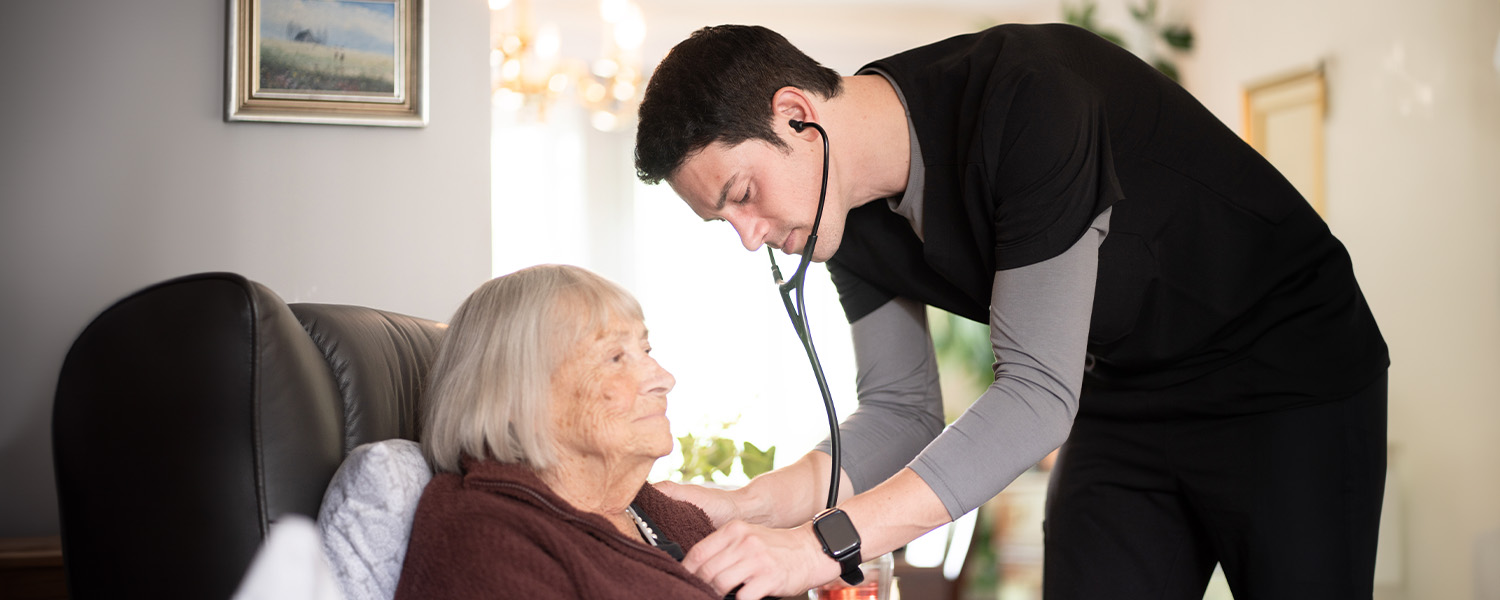Kent Hospital at Home (HaH) program launched in 2022 – and has been providing quality care from the comfort of patients' homes ever since. Think of it as the old-fashioned house call but with a modern twist.
Not only was Kent HaH the first such program in RI, but it is also the only licensed hospital-at-home program in the state. This “inpatient” care model provides a full spectrum of hospital treatment in the home. Hospital at Home doctors visit once daily, while nurses visit twice a day. When medical staff isn’t there, patients are monitored 24/7 and in real-time.
While there are many benefits for patients, HaH can also ease the minds of caregivers. Here are the top four (4) ways Kent Hospital at Home benefits caregivers.
1. Caregivers can save time and money with Kent Hospital at Home.
The program is generally appropriate for conditions with low rates of complications. It’s important to point out that Kent Hospital at Home is not for every patient.
Conditions with low rates of complications include, but are not limited to:
Essentially, patients who qualify are healthy enough to be monitored from home without needing immediate hospitalization. This is where the first benefit to caregivers comes in.
Kent Hospital at Home saves time and money by avoiding frequent trips to the hospital and prolonged hospital stays (which we know can be costly). According to a study by the American Academy of Home Care Medicine participants in home-based primary care had 9% fewer hospitalizations and 20% fewer emergency department visits.
2. Patients and caregivers get one-on-one attention.
A Kent Hospital at Home doctor visits once daily, and a nurse comes by twice a day. These visits are scheduled, so patients and caregivers know when they are coming.
Also, when medical staff is there, they are focused on that patient only. There is no getting pulled to another room or another patient. Patients and caregivers have the undivided attention of medical staff.
Caregivers can ask any and all questions about the treatment of a loved one, without interruption.
3. Get more quality time with loved ones.
When a caregiver visits a hospitalized loved one, they often become more like a nurse or advocate. It’s common for a caregiver to spend their time tracking down a doctor or nurse and asking prognosis and treatment questions.
With Hospital at Home, caregivers know when the medical team will be visiting, so they can get all the information about their loved one's treatment out of the way. The rest of the visit can be about quality time together.
HaH patients also wear a bio-patch so their vitals can be monitored 24/7 – even when the medical team isn’t there. This can give caregivers peace of mind when they visit, knowing they don’t have to take over for the doctor or nurse – because the HaH team’s got this!
4. Watch your loved one heal at a faster pace.
There are many benefits to Kent Hospital at Home – including a better healing process. Kent Hospital at Home’s medical director, Dr. Michael Lee says, “Patients heal better, faster when they are in the comforts of their home, eating their own food, sleeping in their own bed.”
Also, prolonged stays in the hospital put patients at risk of contracting an infection. Common healthcare-associated infections (HAIs) include MRSA, urinary tract infections, and sepsis. When a patient is treated at home, they can avoid these dangerous infections.
Take it from Gregg whose mother is a Kent Hospital at Home patient, “Being at home has helped her heal that much quicker.”
How do I learn more about Kent Hospital at Home?
Speak with your healthcare provider to see if Kent Hospital at Home is right for you or your loved one. For more information right now, visit: https://www.kentri.org/services/kent-hospital-at-home
Disclaimer: The content in this blog is for informational and educational purposes only and should not serve as medical advice, consultation, or diagnosis. If you have a medical concern, please consult your healthcare provider, or seek immediate medical treatment.

 Hospital-quality care at home. How Kent Hospital at Home benefits caregivers, too."
class="bg-img"
fetchpriority="high"
loading="eager"
decoding="async">
Hospital-quality care at home. How Kent Hospital at Home benefits caregivers, too."
class="bg-img"
fetchpriority="high"
loading="eager"
decoding="async">